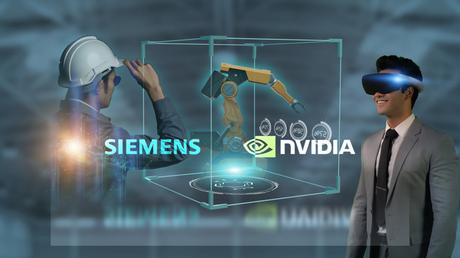
Siemens, a leader in industrial automation, and NVIDIA, a pioneer in artificial intelligence, have teamed up to usher in a new era of the industrial metaverse. The initial step in their collaboration is to join Siemens Xcelerator and NVIDIA Omniverse, a 3D platform, to provide several features for companies to combine digital twins and artificial intelligence.
The compatibility between digital twins, a term which refers to making a digital copy of a physical object, and artificial intelligence should offer the companies more confidence in making product lifecycle decisions. The integration will increase productivity and process improvement with a focus on IoT (the Internet of Things) and analytics.
In the press announcement for the collaboration between the two companies, the author mentions tackling future engineering problems in a visually rich and immersive environment, synonymous with the metaverse.
“Physics-based digital twins connected with artificial intelligence to provide a chance to transform our economies and industries,” stated Roland Busch, CEO of Siemens AG. The companies will do this using Siemens’ and NVIDI’s technology. This new industrial metaverse joins hardware to software from the edge to the cloud.
Jensen Huang, the CEO of NVIDIA, stated that the two companies share a common vision of driving digital transformation. NVIDIA’s Omniverse connection to the Siemens Xcelerator exposes it to the “entire new world” of industrial automation which Siemens’ solutions are creating.
2022 has seen numerous metaverse developments
The Metaverse, a shared social space created for virtual and augmented reality, has countless advantages for several segments of society. After Mark Zuckerberg changed Facebook’s name to Meta in 2021, many companies became excited in the growing technology. Below are some developments in the metaverse and related industries in the current year.
Initially, Meta has been busy. It has integrated NFTs into Instagram, launched 3D avatars for its suite of social apps, and hosted metaverse concerts in Horizon Venues. Zuckerberg isn’t shy about his ambition to create a broadly-accepted metaverse, and it’s showing.
Second, numerous companies have dabbled in or created experiences in VR. The technology, that uses helmets to draw images exactly onto users’ eyes, has attracted top companies such as Fender and BMW dive in.
Ultimately, Yuga Labs, a homegrown Web3 company, is beginning to create its Otherside metaverse. Actually, load testing for that virtual world begins in the current week. People were very hyped about Otherside that the first NFT mint caused Etherscan to crash.
The collaboration between Siemens and NVIDIA is definitely appealing and, if done well, could herald even more innovation for a space which is now moving so quickly.
Leave this field empty if you're human: